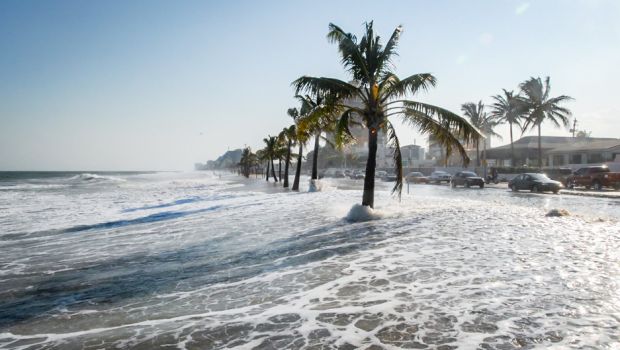Rising Sea Levels: Catastrophe For Coastal Communities

Table of Contents
The Causes of Rising Sea Levels
Rising sea levels are a complex issue with multiple contributing factors, all interconnected with the larger issue of climate change. Understanding these causes is crucial to developing effective solutions.
Thermal Expansion
As the Earth's atmosphere warms, so do its oceans. This warming causes water to expand, increasing its volume. This phenomenon, known as thermal expansion, is a significant contributor to rising sea levels.
- The relationship between temperature and water volume is directly proportional: higher temperatures lead to greater expansion.
- Data from NASA and NOAA show a clear upward trend in global ocean temperatures over the past century, directly correlating with rising sea levels.
- Ocean warming also impacts ocean currents and salinity, further complicating the issue and affecting local sea level rise rates.
Melting Ice Sheets and Glaciers
The melting of ice sheets in Greenland and Antarctica, along with the widespread retreat of glaciers worldwide, is another major driver of rising sea levels. As these massive ice bodies melt, they release vast quantities of water into the oceans.
- Studies show that the Greenland ice sheet is losing mass at an accelerating rate, contributing significantly to sea level rise.
- The Antarctic ice sheet, while currently melting at a slower rate, holds the potential for catastrophic sea level rise if its melting accelerates.
- Glacier melt in mountainous regions also contributes to rising sea levels, with observable impacts in regions like the Himalayas and the Alps. The acceleration of glacier melt is directly related to increasing global temperatures.
Land Subsidence
In addition to the expansion of ocean water and melting ice, land subsidence plays a role in the relative rise of sea levels. Land subsidence is the sinking of land, often due to human activities like groundwater extraction. This sinking land makes coastal areas more vulnerable to flooding, even if the absolute sea level rise remains constant.
- Over-extraction of groundwater causes the land to compact, leading to subsidence in many coastal regions.
- Natural geological processes, such as tectonic plate movement, can also contribute to land subsidence.
- Coastal regions experiencing both land subsidence and rising sea levels face a double threat, experiencing higher rates of relative sea level rise than areas without land subsidence.
Impacts on Coastal Communities
The effects of rising sea levels on coastal communities are already being felt worldwide, with devastating consequences.
Increased Flooding and Erosion
More frequent and intense coastal flooding and erosion are among the most immediate and visible impacts of rising sea levels. Storm surges, high tides, and increased wave action combine to cause significant damage to infrastructure, property, and livelihoods.
- Many low-lying coastal areas are experiencing more frequent and severe flooding events, damaging homes, businesses, and vital infrastructure.
- Coastal erosion is leading to the loss of land and beaches, impacting tourism and coastal economies.
- The economic losses associated with flooding and erosion are substantial and are projected to increase dramatically in the coming decades.
Loss of Habitat and Biodiversity
Rising sea levels lead to the inundation and erosion of coastal ecosystems, including wetlands, mangroves, and coral reefs. These ecosystems are vital for biodiversity and provide essential services, such as coastal protection and fisheries. Their loss has severe consequences for both wildlife and human communities.
- Mangrove forests, crucial for coastal protection and biodiversity, are being lost at alarming rates due to sea level rise and coastal development.
- Coral reefs, which support a vast array of marine life, are highly vulnerable to rising sea temperatures and ocean acidification, both linked to climate change.
- The loss of coastal habitats leads to a decline in biodiversity, threatening numerous plant and animal species.
Displacement and Migration
As sea levels rise and coastal areas become increasingly uninhabitable, millions of people face displacement and migration. This creates significant social, economic, and political challenges.
- Climate refugees, those forced to leave their homes due to climate change impacts like sea level rise, are an increasingly significant global concern.
- The displacement of populations can strain resources in receiving areas and lead to social unrest.
- The economic costs of relocation and resettlement can be enormous, placing additional burdens on governments and international organizations.
Mitigation and Adaptation Strategies
Addressing the threat of rising sea levels requires a combination of mitigation and adaptation strategies.
Reducing Greenhouse Gas Emissions
The most crucial step in addressing rising sea levels is to drastically reduce greenhouse gas emissions to slow the rate of climate change. This requires a global effort to transition to cleaner energy sources and adopt sustainable practices.
- Investing in renewable energy sources, such as solar, wind, and geothermal power, is essential.
- Implementing policies to reduce carbon emissions from transportation, industry, and agriculture is crucial.
- International cooperation and agreements, such as the Paris Agreement, are vital for coordinated global action.
Coastal Protection Measures
Coastal protection measures, such as seawalls, breakwaters, and beach nourishment, can help protect coastal communities from the immediate impacts of rising sea levels. However, these measures are often expensive and may not be sustainable in the long term.
- Seawalls and other hard engineering solutions can be effective in the short term but can have negative environmental consequences.
- Managed retreat, the planned relocation of communities away from vulnerable coastal areas, may be necessary in some cases.
- Nature-based solutions, such as restoring wetlands and mangroves, can provide cost-effective and environmentally beneficial coastal protection.
Community Resilience Building
Empowering coastal communities to adapt to rising sea levels is crucial. This involves strengthening their capacity to prepare for and respond to extreme weather events, manage resources, and build resilient infrastructure.
- Investing in early warning systems and disaster preparedness programs can help reduce the impact of flooding and other extreme weather events.
- Promoting sustainable land management practices and reducing vulnerability to erosion can help protect coastal areas.
- Supporting community-based adaptation initiatives that prioritize local knowledge and empower communities to develop their own solutions is essential.
Conclusion
Rising sea levels pose a significant and escalating threat to coastal communities worldwide. The impacts, ranging from increased flooding and erosion to displacement and biodiversity loss, are profound and require urgent action. Addressing the challenge of rising sea levels demands a multifaceted approach involving global cooperation to reduce greenhouse gas emissions, the implementation of effective coastal protection measures, and the strengthening of community resilience. We must act now to mitigate the devastating effects of rising sea levels and protect vulnerable coastal communities. Learn more about the impact of rising sea levels and how you can contribute to solutions.

Featured Posts
-
 I Tzesika Simpson Kai I Frontida Tis Fonis Tis Mythos I Pragmatikotita
May 11, 2025
I Tzesika Simpson Kai I Frontida Tis Fonis Tis Mythos I Pragmatikotita
May 11, 2025 -
 Exploring The Mansions Featured On Mtv Cribs Design And Lifestyle
May 11, 2025
Exploring The Mansions Featured On Mtv Cribs Design And Lifestyle
May 11, 2025 -
 Anthony Mackie In A Childrens Film A Sneak Preview And Review
May 11, 2025
Anthony Mackie In A Childrens Film A Sneak Preview And Review
May 11, 2025 -
 Boston Celtics Clinch Division After Blowout Victory
May 11, 2025
Boston Celtics Clinch Division After Blowout Victory
May 11, 2025 -
 Jose Aldo De La Defaite A La Victoire Son Adaptation
May 11, 2025
Jose Aldo De La Defaite A La Victoire Son Adaptation
May 11, 2025
